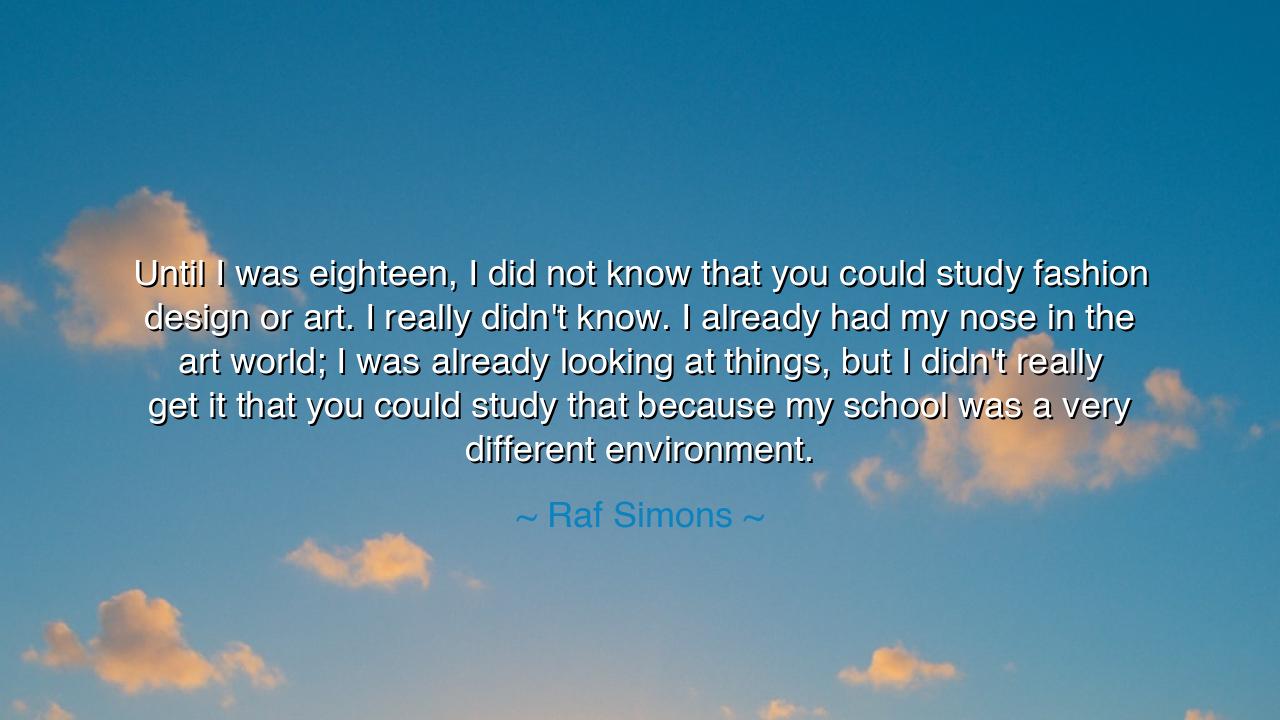
Until I was eighteen, I did not know that you could study fashion
Until I was eighteen, I did not know that you could study fashion design or art. I really didn't know. I already had my nose in the art world; I was already looking at things, but I didn't really get it that you could study that because my school was a very different environment.






“Until I was eighteen, I did not know that you could study fashion design or art. I really didn't know. I already had my nose in the art world; I was already looking at things, but I didn't really get it that you could study that because my school was a very different environment.” Thus spoke Raf Simons, the visionary who shaped the soul of modern design with humility and wonder. His words are not merely a recollection of youth—they are the echo of a universal truth: that genius often begins in ignorance, that the seeds of destiny lie hidden beneath the soil of unknowing. In his confession, we find the quiet awe of discovery, the moment when one realizes that the dreams stirring within are not illusions but callings, waiting to be named.
There is a deep poignancy in Simons’s revelation. Here is a young man, already touched by beauty, already breathing the air of creation, yet unaware that his fascination could become a life’s path. His eyes were open, but the world around him was closed. He lived in an environment where the imagination was not nurtured, where the arts were distant stars—visible, but unreachable. And yet, the spark within him endured, waiting for its time to be seen. His story is a testament to the power of exposure—that to know something exists is often the first miracle that sets a soul in motion.
How many have lived like this—surrounded by possibility, yet unaware of its form? The tale of Vincent van Gogh bears the same sorrowful echo. Before he found painting, he wandered through trades and ministries, searching for a name for the fire that burned within him. The world told him he was lost, but in truth, he was still blind to the language of his own gift. When at last he discovered the art that matched his soul, he bloomed like a storm of color, though the world did not yet understand. Such is the fate of many creators: their hearts awaken long before their minds know the path to follow.
Simons’s words remind us that education, in its truest sense, is not the filling of the mind but the opening of the eye. To learn that one can study art is not simply to gain access to a classroom—it is to be given permission to exist as oneself. In ancient times, the masters of Greece and Egypt believed that knowledge was sacred revelation—that every child was born with a divine spark, and that the teacher’s duty was to help them uncover it. How tragic, then, that in our modern world so many are taught to ignore the inner callings of their spirit. The young Raf did not yet know he could shape the world with design, because no one had told him that creation was holy work.
Yet from such beginnings are the greatest journeys born. When the realization finally comes—that the dream within is not madness but mission—it strikes like lightning across the soul. It is the moment the wanderer becomes the artist, the observer becomes the maker. Simons’s awakening is not unlike the moment when the sculptor Michelangelo first laid his chisel upon the marble and saw the angel trapped within. The discovery that one’s love for beauty is not folly but vocation transforms ignorance into destiny. It is a sacred unveiling—a rebirth of self.
In this, Simons teaches us a lesson of profound hope. He reminds us that it is never too late to begin, never too late to awaken to one’s purpose. The walls of circumstance cannot imprison a vision that longs to be free. Even if your environment offers no mirrors, you must still search for the reflection of who you might become. For the voice of destiny whispers to all, though not all have ears to hear it. If you do not yet know what you are meant to do, keep looking, keep questioning, keep seeking beauty in all its forms—until the truth reveals itself.
And what shall we, the listeners of this teaching, do with it? Let us create spaces of revelation. Let us teach the young—and ourselves—that art, design, music, invention, all these are not luxuries but languages of the human soul. If you are a parent, open your child’s eyes to wonder. If you are a teacher, show your students the doors they did not know existed. And if you are the dreamer yourself, do not wait for permission—step through the invisible gate, for beyond it lies your purpose.
So remember this: the beginning of greatness is not knowledge, but discovery. Like Raf Simons, you may walk for years beside your destiny without seeing it. But when at last you do, greet it not with regret, but with gratitude. For even in your unknowing, you were being prepared. Every unseen hour, every restless curiosity, was leading you toward the moment when you would finally understand—you were never lost; you were simply waiting to awaken.






AAdministratorAdministrator
Welcome, honored guests. Please leave a comment, we will respond soon